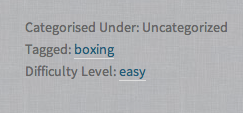To add in custom taxonomy terms into custom post types in Genesis WordPress theme you need to create a function with a conditional that equals the custom post type then set the post meta using shortcode which includes the taxonomy terms, then apply a filter to the result to the genesis_post_meta function in your functions.php file.
You can choose to have the custom taxonomy on its own or a mixture with categories and tags.
//Filter the Taxonomy Meta on a CPT
function themeprefix_genesis_post_meta_filter( $post_meta ) {
if ( 'coaching_technique' == get_post_type() ) {//swap in CPT name
$post_meta='';//swap in taxonomy and label name
return $post_meta;
}
elseif ( 'post' == get_post_type() ) {
return $post_meta;
}
}
add_filter( 'genesis_post_meta','themeprefix_genesis_post_meta_filter', 11 );

Only Custom Taxonomy is shown
In the example above the custom post type is ‘coaching technique‘, the taxonomy is ‘difficulty-level‘ and a before label of ‘Difficulty Level‘ is used.
If you wanted to also keep the categories and tag values also you would also add those in the post_terms values like so:
//Filter the Taxonomy Meta on a CPT
function themeprefix_genesis_post_meta_filter( $post_meta ) {
if ( 'coaching_technique' == get_post_type() ) {//swap in CPT name
$post_meta='Categorised Under: WordPress ';//swap in taxonomy and label name
return $post_meta;
}
elseif ( 'post' == get_post_type() ) {
return $post_meta;
}
}
add_filter( 'genesis_post_meta','themeprefix_genesis_post_meta_filter', 11 );
The above would give all taxonomy terms, custom, categories and tags.

Custom and Regular Taxonomy are shown
The code has an elseif option to return just the regular post meta; categories and tags for regular posts.
Thanks to Brad Potter for optimising the code.